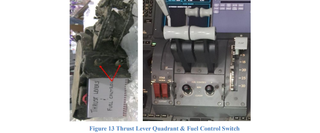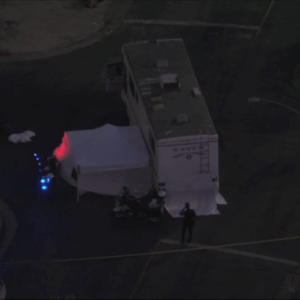A pilots’ union has hit out at the initial report into the Air India crash for raising the possibility of human error.
The preliminary report published by India’s Aircraft Accident Investigation Bureau, which is part of the ongoing probe into what caused the Boeing 787-8 Dreamliner to come down, found that fuel control switches were moved to “cut-off” position as the aircraft rose from take-off.
Experts have since said it is not easy to “accidentally” cut off fuel switches.
The 15-page document also includes a conversation between the pilots on the fuel controls before the crash. “In the cockpit voice recording, one of the pilots is heard asking the other why did he cut-off. The other pilot responded that he did not do so,” it stated.
In a statement issued in response, The Hindu reported the Airline Pilots’ Association of India (ALPA-I) said: “The tone and direction of the investigation suggest a bias toward pilot error. ALPA-I categorically rejects this presumption and insists on a fair, fact-based inquiry.”
Victims’ families are stunned following the report’s release.
Badasab Syed, 59 – who lost his brother, 49-year-old IT professional Inayat Syed, his sister-in-law, and their two children in the tragedy – told the BBC he has just been left with more questions, as he asked whether the tragedy was “avoidable”.
Of the 242 people onboard flight AI171 to London Gatwick on 12 June, 241 were killed, including 53 British nationals. The flight crashed into a hostel complex at Byramjee Jeejeebhoy Medical College in Ahmedabad, also killing several students and residents on the ground. Only one passenger – a British-Indian man seated in 11A – survived. A total of 260 people died in the tragedy.
‘Very unusual’ if person moved fuel switches before Air India crash, aviation expert says
If the fuel switches that were cut off before the Air India plane crash were moved by a person, that would have been a “very unusual thing to do” at below 1,000 feet, an aviation expert has said.
Professor Graham Braithwaite, director of aerospace and aviation at Cranfield University, said: “It’s not the point of flight where you try and call for your coffee, it’s a period of flight where your focus is very, very clear, and that first 1,000 feet, it’s about keeping the airplane climbing and that’s not about clicking switches.”
He added: “I could see why a nervous flyer would be nervous at the thought that it’s possible to shut both engines down at a critical stage in flight, but for whatever reason, and that there are a number of things that are in place to stop it from accidentally happening.”
The aircraft was about 11 years old, the fuel switches had been changed two years ago, and the crash was a “really, really unusual event”, Professor Braithwaite said.
Of the next stage of the investigation, he said: “If somebody did wilfully move a switch, then was it on the one hand a wilful active sabotage, in which case the investigation changes considerably, because this safety investigation that published the report yesterday will not be leading on that, that would be a police investigation.
“So that would change at that point, but if it wasn’t clear that it was that wilful action, you’d be looking at, well, what kind of mistake might somebody have made?”
Tara Cobham13 July 2025 12:00
Watch: Air India crash sole survivor recalls how he escaped plane
Tara Cobham13 July 2025 11:38
Expert claims pilot may have deliberately crashed Air India plane, according to reports
An expert has claimed a pilot may have deliberately crashed the Air India plane, according to Indian media.
Captain Mohan Ranganathan, who is one of India’s leading aviation experts, is among the first to raise the possibility that deliberate human action could have caused the tragedy, NDTV reported.
Speaking to the broadcaster, he highlighted the movement of fuel control switches to “cut-off” positions as well as conversations between the pilots, which have been outlined in the newly published findings from India’s Aircraft Accident Investigation Bureau.
In response to NDTV’s question over whether one of the pilots could have intentionally switched off the fuel, knowing that this could cause a crash, Captain Ranganathan said: “Absolutely.”
He continued: “It has to be manually done. It cannot be done automatically or due to a power failure because the fuel selectors are not the sliding type. They are designed to stay in a slot, and you have to pull them out to move them up or down. So, the possibility of inadvertently moving them to the ‘off’ position doesn’t arise. It’s definitely a case of deliberate manual selection to move it to ‘off’.”
Tara Cobham13 July 2025 11:04
Watch: UK student missed doomed Air India flight by minutes
Tara Cobham13 July 2025 10:32
Not easy to ‘accidentally’ cut off fuel switches, expert says on Air India crash
The fuel switches that were cut off before the Air India plane crash are the kind used on every flight, and designed so that this cannot easily “accidentally” happen, an aviation expert has said.
The fuel switches are used at the end of every flight and in emergency scenarios such as a fire, director of aerospace and aviation at Cranfield University, Professor Graham Braithwaite said, adding that pilots would generally run through a checklist before turning them off.
He said: “For obvious reasons, the two switches are a distance apart, so not a huge distance, but enough that you couldn’t accidentally switch two when you’re trying to switch one.
“So it’s not like the lights in your house, where they’re right next to each other, so there is some space between them.
“They’re in that centre console, so that’s in between the two pilots, so they can each reach them with the same ease.”

Tara Cobham13 July 2025 10:01
Watch: Air India flight ‘was doomed’ without sufficient power, explains Simon Calder
Tara Cobham13 July 2025 09:33
Report suggesting pilot error over fuel switch cut off sparks union fury
A pilots’ union has hit out at the initial report into the Air India crash for raising the possibility of human error.
In a statement issued in response to the preliminary report in to the Air India crash, The Hindu reported the Airline Pilots’ Association of India (ALPA-I) said: “The tone and direction of the investigation suggest a bias toward pilot error. ALPA-I categorically rejects this presumption and insists on a fair, fact-based inquiry.”
Tara Cobham13 July 2025 09:00
Full story: Air India crash investigation finds fuel switches cut off moments before impact
A preliminary report into the Air India crash that killed 260 people last month showed three seconds after taking off, the plane’s engines fuel cutoff switches almost simultaneously flipped from run to cutoff, starving the engines of fuel.
One pilot can be heard on the cockpit voice recorder asking the other why he cut off the fuel. “The other pilot responded that he did not do so,” the report said.
My colleague Alex Ross has the full story:
Tara Cobham13 July 2025 08:33
Aviation regulator defends the safety of India’s skies following Air India crash
Air India flight AI171 took off from Ahmedabad for a journey to London Gatwick on 12 June, yet only moments after takeoff, the Boeing 787crashed into a medical student accommodation.
All but one of the 242 passengers on board died, with further casualties on the ground bringing the death toll to at least 275.
My colleague Amelia Neath reports:
Tara Cobham13 July 2025 07:51
Air India crash likely to trigger India’s biggest aviation insurance payout
The deadly Air India crash outside Ahmedabad earlier this month could result in the most expensive aviation insurance claim in India’s history, insurance experts say.
Investigators continue to probe what caused the Boeing 787-8 Dreamliner to plummet into a crowded residential complex into crash in Ahmedabad just 33 seconds after take-off on 12 June.
The total liability could range from $211m to $280m (approximately £166m to £220m), according to estimates reported by Press Trust of India. This includes the full hull value of the aircraft, compensation for victims’ families under international aviation law, and payouts for third-party property damage and loss of life on the ground.
While the airlines’ losses are expected to be covered under aviation “all-risk” insurance, the payouts for passengers are governed by the Montreal Convention, to which India is a signatory.
Arpan Rai13 July 2025 07:08





